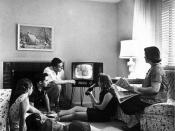IMPACT OF TELEVISION VIOLENCE
IN RELATION TO JUVENILE DELINQUENCY
TABLE OF CONTENTS
IntroductionEffects Of Television - The BeginningCorrelational ExperimentsField ExperimentsCause And Effects On Types Of ChildrenConclusionReferences 113568
When children are taught how to tie their shoes, it is because of how their parents showed them. When children are taught how to do math problems it is because how their teachers show them. With all of the role models how does television effect our children?
Many adults feel that because they watched television when they were young and they have not been negatively affected then their children should not be affected as well. What we must first realize is that television today is different than television of the past, violence is more prevalent in todays programming unlike the true family programming of the past.
EFFECTS OF TELEVISION - THE BEGINNING
Questions about the effects of television violence have been around since the beginning of television.
The first mention of a concern about television's effects upon our children can be found in many Congressional hearings as early as the 1950s. For example, the United States Senate Committee on Juvenile Delinquency held a series of hearings during 1954-55 on the impact of television programs on juvenile crime. These hearings were only the beginning of continuing congressional investigations by this committee and others from the 1950s to the present.
1
In addition to the congressional hearings begun in the 1950s, there are many reports that have been written which include: National Commission on the Causes and Prevention of Violence (Baker & Ball, 1969); Surgeon General's Scientific Advisory Committee on Television and Social Behavior (1972); the report on children and television drama by the Group for the Advancement of Psychiatry (1982); National Institute of Mental Health, Television and Behavior Report (NIMH, 1982; Pearl, Bouthilet, &...


